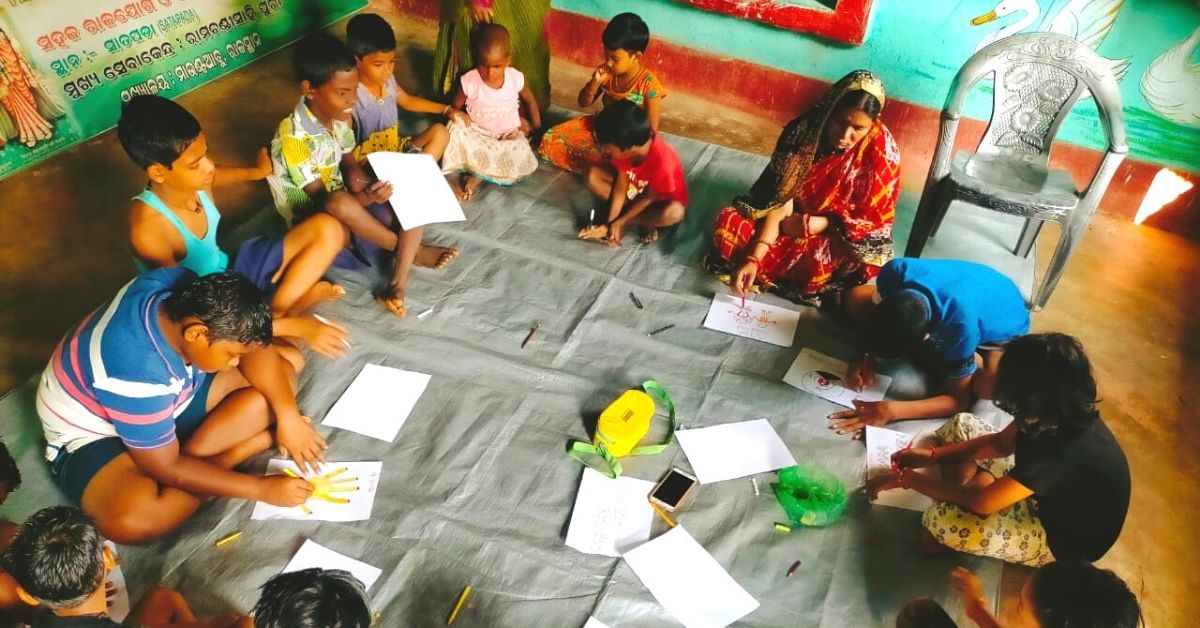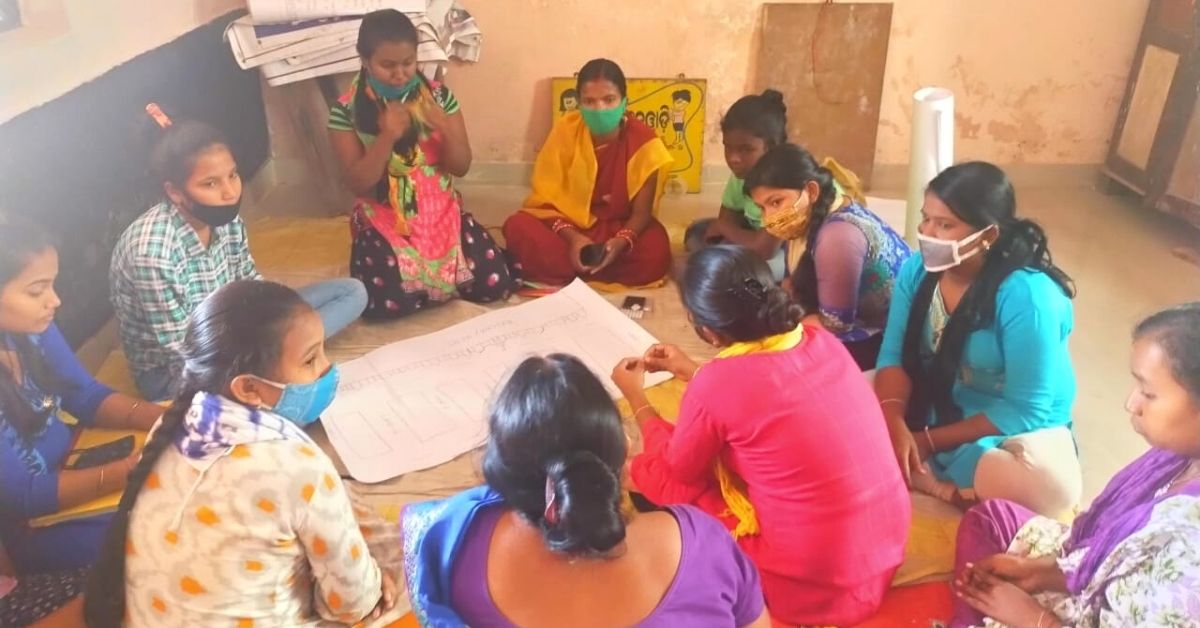Odisha born Dharitri Patnaik recalls that her childhood was far from easy. At the age of just five, she was abused by a family member. “My repeated attempts to raise my voice against what was happening went unheard,” she says.
And when she turned 14, she lost her father, leaving her 32-year-old mother to single-handedly raise a child.
“We lost everything. My mother was stripped-off all her marital rights, and abandoned by my dad’s family members. We had no social support. The trauma was such that I could not sleep well for years, and continue to suffer from a sleep disorder to date,” she tells The Better India.
She adds, “I decided to fight my way out and overcome my fears.”
Today, through her NGO Humara Bachpan Trust, Dharitri has rescued hundreds of rural girls from child marriage, as well as women from domestic violence, and empowered them by making them financially independent.
Here is her story.
Representing the most marginalised

“I realised that my situation was not unique, and that many women and children were suffering the same fate as me. I wanted to help marginalised communities and started working for rag pickers in my hometown, Bhubaneswar. I was in class 10 when I first offered literacy classes and created awareness to protect girls and women from abuse,” the 49-year-old says.
Dharitri pursued her post-graduation in social work from Tata Institute of Social Sciences, and specialised in criminology to help the needy through her skills. Later on, she worked with Woman ActionAid, India, a global organisation working for tribal rights in Odisha. “I worked to empower affected women and children who were left orphaned in the cyclone in 1999. I played a key role in the participatory planning process for their rehabilitation,” she explains.
She eventually pursued another master’s degree in public administration at Harvard University, USA and contributed to international organisations like United Nations Children’s Fund (UNICEF), United Nations Development Fund for Women (UNIFEM), Cooperative for Assistance and Relief Everywhere (CARE), Bernard van Leer Foundation (BvLF). She also worked with organisations outside India, and eventually focussed her work in Odisha in sectors of urban development, poverty eradication and contributing in knowledge management and public policy.
After her immense contribution for over two decades, Dharitri says she realised the organisations she was working with lacked representation of people belonging to underprivileged backgrounds.
“The organisations chalked out campaigns and policies to help children and women. However, they did not have a participatory role in them. On many occasions, the representation was symbolic, and the beneficiaries remained as passive recipients,” she says.
“The other issue with the enforcing agencies was that on most occasions, the agencies adopted projects that helped them financially sustain and were more result-driven with targets than achieving genuine results on the ground,” she explains.
Dharitri felt the need for an organisation propelled by beneficiaries. “I wanted the people from the community to voice their concerns and deliver results,” she says.

In 2012, she launched Humara Bachpan Trust, a people-led organisation that has helped children and women across 14 cities in ten states of India. “We have reached 1,35,000 children, 5,000 women and 18,000 adolescent girls. Of the total reach, over 1,858 lost children have been contacted and rescued from Bhubaneswar railway station, 11 child-marriages stopped, and over 18,764 girls helped in various career prospects,” she says.
Moreover, about 450 dropout children are now a part of mainstream education, she notes.
Vulnerable girls from impoverished backgrounds have been provided with self-defence skills, and created awareness about sexual and reproductive health to bring social change across villages.
“We have five trustees, three of whom are a part of the community. None of the members are paid or receive an honorarium. Over 90 per cent of the members are from the communities working in respective areas, who draw policies, plan lines of work and execute them,” she says.
Dharitri says the organisation does not work based on projects and focuses on the needs of children and women.
“We identify children who are school dropouts, victims of domestic abuse, and other personal crises. We rescue lost children from the railway station and reconnect them with families, or find them a safe place. We have developed Early Childhood Care & Development (ECCD) interventions that focus on developing physical, emotional, cognitive, creative and language skills. The modules are inclusive, offering quality education aligned to the United Nations sustainable development goals (SDG-4),” she notes.
“The children undergo a play-based and experimental approach in the learning process,” she says, adding that the activities are conducted in respective villages or anganwadis with the government.
Usharani Patra, a resident of Sikharchanti Nagar in Bhubaneswar, learned about the NGO during an event held by the community members in her area. “My family’s financial condition is poor, and they cannot afford education. The NGO funded my education after class 10 and enabled me to graduate in journalism. Currently, I am pursuing post-graduation in the same field,” she says.
Usharani says the NGO has helped her gain a new lease on life. “I always feel confident with their support as I receive necessary guidance in my personal and professional life at all times,” she adds.
Dharitri’s efforts have also helped Bhubaneswar become one of the first child-friendly cities in India. “We have contributed and partnered with the city administration to draft the proposals and implement the socially smart Bhubaneswar city project,” she adds.
‘More milestones to achieve’
To work towards women empowerment, the non-profit initiated Personal Advancement & Career Enhancement (PACE) to impart life skill training, thus enabling secure employment and entrepreneurship prospects.
“The programme is aimed to enhance the lives of underprivileged adolescent girls and women, enabling them to earn an independent living, thereby bringing them out of poverty. The women become acquainted with sustainable pathways to increase their entrepreneurial competitiveness and business management through capacity building,” she shares.
Khireswari Pradhan from Gadamunda village in Odisha, one of the many beneficiaries, says, “My family was facing financial crunches, and my husband’s income was not enough to meet the daily expenses. I started growing vegetables in my backyard and selling them in the market for income generation to support him.”
However, she came across PACE training in her village and learned how to grow mushrooms. “I attended a 10-day workshop organised by HBT and Rural Self Employment Training Institution (RSETI), to grow different types of mushrooms. Today, I sell five kilos of the harvest daily, and adequate to meet the financial needs of the family,” Khireswari says.
Dharitri says she is lucky to receive support from all corners for her social cause. “My difficulty is that I have not been able to scale up the work as much as I aimed with limited resources,” she says, adding, “But I am glad to have achieved so much in less than a decade.”
“After my childhood experience, I decided not only to change my own life, but also that of hundreds of women and children,” she concludes.
Edited by Divya Sethu
No comments:
Post a Comment